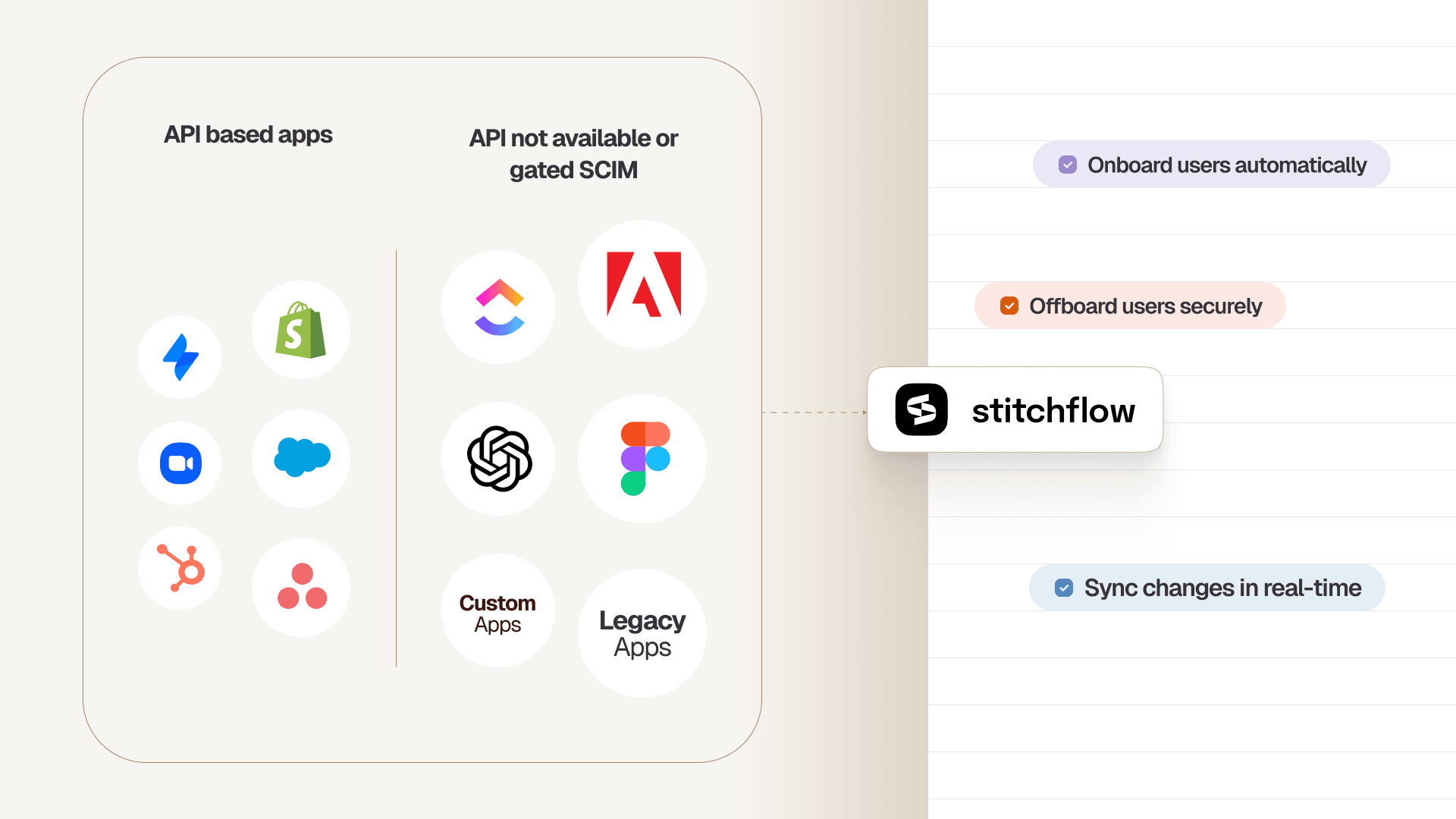Zluri is a powerful platform. If you have a dedicated engineering team, a bottomless budget for Enterprise plans, and the time to build and debug your own custom integrations using their SDK, it’s a formidable tool.
But for most IT teams, the problem isn't a lack of tools—it's a lack of finished outcomes.
Zluri excels at the "Happy Path": the 70% of your stack that has clean, documented APIs and SCIM support.
But when it faces the messy reality of the other 30%—the apps charging a 300% "SCIM Tax" (like Adobe or Figma), the legacy internal tools, or the new AI apps without APIs—Zluri’s answer is often a "Custom Builder" or a manual ticket.
In other words: they give you the bricks, but you still have to build the wall.
This leaves you with a dangerous "Maintenance Gap." You trade manual provisioning for manual script debugging. When a vendor updates their UI or a session token expires at 2 AM, your "no-code" workflow breaks, and the burden falls right back on you.
Stitchflow is the only platform that treats automation as a service, not a software toolkit. We don’t ask you to build the integration; we build, maintain, and guarantee it for you.
Using resilient browser automation backed by a 24/7 human-in-the-loop engineering team, we turn your disconnected, non-SCIM apps into reliable, secure APIs. If a workflow breaks, we fix it in 15 minutes—usually before you even know it happened.
Here are the 8 best Zluri alternatives for 2026, starting with the only one that closes the gap for you.
Why teams look for Zluri alternatives: The 6 biggest pain points
Zluri is a capable platform for discovery. If your primary goal is to generate a report of all the apps your employees have signed up for, it does the job well.
But as IT teams shift from passive observation (finding apps) to active remediation (fixing gaps), Zluri’s limitations often turn into operational roadblocks.
We analyzed verified user feedback from G2, Gartner Peer Insights, and Reddit to pinpoint exactly where the "break point" happens.
1. A large library of integrations doesn't mean they all work
Zluri boasts 800+ integrations, but users frequently discover that breadth does not equal depth.
You might connect an app only to find the integration is "read-only". It can see a license, but it can’t provision a user or revoke access without you building a custom workflow.
"Zluri has a lot of integrations but they don't have a full action for any integration... We have had to hold-off on certain integrations because the risk-reward... was not worth it."
— Verified User, Gartner Peer Insights
2. "Custom builders" create unexpected technical debt
For apps that aren’t natively supported, Zluri offers a "Custom App Integration" builder. While pitched as a flexibility feature, it effectively shifts the engineering burden back to your team.
You aren't just buying a tool; you are taking on a development project. IT teams report that configuring and maintaining these custom connections requires technical bandwidth they simply don't have.
"There isn't much customization to fit our environment... requests for relatively simple customizations [were] denied because the backend team didn't have the bandwidth."
— Verified User, Gartner Peer Insights
3. You are forced to pay the "SCIM tax" just to automate provisioning
Zluri relies heavily on standard APIs for provisioning. This forces you into a binary choice: either pay the vendor’s 200% to 300% markup for the "Enterprise Plan" to unlock API (the "SCIM Tax"), or accept that Zluri cannot automate that app.
For tools like Adobe, Figma, or Asana, this leaves you stranded. You are unable to automate the standard plans that most mid-sized companies actually use.
4. When workflows break, you are the one debugging them
Automation is supposed to remove work, not create it. However, users report that Zluri’s workflows can be brittle.
When an integration breaks, often because a token expired or a rate limit was hit, the workflow fails silently or throws an error that your team must investigate.
"Zluri's discovery was impressive but... integrations didn't always sync right. [It] felt a bit raw."
— u/Crafty_Assignment686, r/ITManagers
5. "Automation" for non-API apps is often just a Jira ticket
When Zluri claims to handle apps without APIs, the reality is often just a ticketing workflow.
Instead of deprovisioning a user directly, the platform creates a ticket for an IT agent to go do it manually.
This doesn't solve the scale problem; it just moves the manual to-do list from a spreadsheet to a ticket queue.
6. Relying on browser extensions creates data lag and deployment headaches
For discovery, Zluri relies heavily on deploying browser extensions and desktop agents to "spy" on usage.
Managing these agents across a distributed workforce is operationally heavy, and data latency often leads to false confidence in your utilization reports.
"The agent rollout and management is cumbersome... The data refresh rate is very lengthy [24 hours]... that refresh rate can cause quite a delay for automations."
— Verified Administrator, Gartner Peer Insights
The Verdict: Zluri helps you see the mess of your SaaS stack, but it leaves the heavy lifting of cleaning it up largely to you.
8 Best Zluri Alternatives and Competitors in 2026
| Platform | Best for | Standout feature | G2 rating |
|---|---|---|---|
| Stitchflow | IT teams needing to automate provisioning for non-SCIM apps and avoid the "Enterprise Tax" | Resilient Browser Automation (automates any app without an API, backed by human-in-the-loop reliability) | 4.8/5 |
| Torii | Ops and IT teams building scalable SaaS workflows and shadow IT detection | Low-code workflow engine for custom onboarding/offboarding automation | 4.5/5 |
| Zylo | Finance and procurement teams focused on SaaS cost control and vendor management | SaaS Contract Repository with license utilization benchmarks for negotiation | 4.8/5 |
| BetterCloud | Security-conscious IT teams enforcing granular SaaS access and data controls | Policy automation engine for file security, DLP, and user lifecycle management | 4.4/5 |
| Productiv | CIOs, CFOs, and procurement teams making ROI-driven SaaS decisions | Feature-level usage analytics (measures deep engagement, not just logins) | 4.6/5 |
| AccessOwl | Fast-moving teams looking to automate access requests inside Slack or Teams | Slack-native provisioning that allows employees to request apps via chat | 4.7/5 |
| Nudge Security | Security teams focused on shadow IT and employee-led SaaS adoption | Security nudges that engage employees to self-remediate unmanaged accounts | 4.7/5 |
| Lumos | Governance and compliance teams needing audit-ready access reviews | Self-service App Store with automated access reviews and approval workflows | 4.7/5 |
1. Stitchflow
Best for: IT teams who need to automate user lifecycle management for any app, especially those blocking SCIM behind an "Enterprise" paywall.
G2 Rating: 4.8/5
Zluri is excellent at discovering SaaS sprawl, but it hits a hard wall when it comes to remediation.
Like most platforms, it relies entirely on vendor APIs. This leaves you stranded with the 30% of your stack that has no API or the critical apps (like Adobe, Figma, or Notion) that lock SSO and SCIM features behind a massive "Enterprise Plan" markup.
Stitchflow is the only platform that solves this 'last mile' problem. It uses resilient browser automation—a managed infrastructure layer that turns any application’s web interface into a structured, reliable API—to enable native-like provisioning for unsupported apps.
This allows you to trigger actions in your IdP just like you would for standard SCIM integrations. It doesn't just report on the mess; it logs in and cleans it up, click-for-click, exactly like a human admin.
Most vendors force you to upgrade to expensive "Enterprise" plans just to get basic security features like automated provisioning. Stitchflow defeats this model. Here’s how:
Defeat the SCIM tax
SaaS vendors often charge 100-300% markups to unlock SSO and SCIM capabilities, forcing IT teams to choose between security and budget. Stitchflow bypasses this "ransom pricing" entirely.
It allows you to automate provisioning and deprovisioning for any app on your existing "Team" or "Pro" plans, effectively unlocking enterprise-grade security without the enterprise-grade price tag.
Deterministic, not heuristic
Unlike "AI agents" that might hallucinate a click or guess a workflow, Stitchflow’s automation relies on deterministic engineering. The system executes pre-validated, rigid workflows (specific admin actions) to ensure 100% accuracy and auditability. It never "guesses"—it follows strict guardrails to ensure the right user is provisioned every time.
Pay-on-delivery pricing
Stitchflow flips the traditional SaaS pricing model of charging platform fees for potential value. Instead, you pay a flat fee per app integration (e.g., $5,000/year), and you only pay after the integration is built, tested, and verified working in your specific environment. This shifts the risk entirely onto Stitchflow to deliver the automation you need.
How Stitchflow works: Automation without fragility
The "flinch factor" with browser automation is reliability because scripts break when UIs change. Stitchflow solves this by treating automation as a managed service rather than a software tool.
- Secure Execution Environment: For every task, Stitchflow spins up a dedicated, isolated headless browser instance inside a secure GCP VPN. It injects credentials from an encrypted vault (never stored in the browser) to perform the action.
- The Reliability Layer (HITL): If a vendor updates their CSS, a CAPTCHA appears, or MFA triggers, the automation pauses rather than failing. It instantly alerts Stitchflow’s 24/7 Human-in-the-Loop (HITL) engineering team.
- Real-Time Resolution: An on-call engineer steps into a secure, sandboxed environment to resolve the blocker within 15 minutes. The automation then resumes and completes the task, delivering 99.5% uptime without you ever touching a script.
Standout features
- The IT Graph: Stitchflow maps the relationships between users, licenses, and activity across your stack. It continuously reconciles data from your HRIS and IdP against actual app usage to flag Orphaned Accounts (active users who have left) and Hidden Accounts (users creating accounts outside of SSO) in real-time.
- Universal User Directory: A single, searchable command center for every identity in your organization. It unifies users from API-connected apps, browser-automated apps, and even CSV-managed legacy tools into one view for bulk offboarding actions.
- Shadow AI Discovery: While Zluri finds general SaaS, Stitchflow specifically hunts for Shadow AI. It scans OAuth tokens to identify unauthorized AI tools (like non-enterprise ChatGPT or rogue notetakers) that have read/write access to corporate data.
- Audit-Ready Evidence: Because every action is performed by a machine (or a human in a recorded sandbox), Stitchflow provides a complete audit trail. You get timestamped logs and full video recordings of every provisioning event to satisfy compliance auditors.
Stitchflow vs. Zluri: The remediation gap
| Feature | Zluri | Stitchflow |
|---|---|---|
| Primary Goal | Visualize SaaS sprawl and spend. | Automate "last mile" provisioning operations. |
| Non-API Apps | Can track spend/contracts but cannot automate user access. | Full automation (create, update, delete) via resilient browser automation. |
| "SCIM Tax" | You must pay the vendor's enterprise markup to enable automation. | Eliminates the markup. Automates "Pro" plans as if they were Enterprise. |
| Maintenance | N/A (Does not build custom integrations). | 100% Managed. Stitchflow builds, repairs, and maintains all integrations. |
| Reliability | Dependent on public API uptime. | Guaranteed 99.5% uptime via 24/7 human engineering support. |
Case study: How SpotOn automates the "disconnected" stack
SpotOn, a global payment-tech company with over 2,000 employees, found themselves trapped in a cycle of manual IT grunt work. With 25+ disconnected apps sitting outside their primary identity workflows, their IT team lost two full days every week manually managing access and cleaning up spreadsheets.
They turned to Stitchflow to close the automation gap without hiring more bodies. The impact was immediate:
- $160,000+ Annual Savings: Identified and reclaimed unused SaaS spend in the first month without upgrading to expensive enterprise plans.
- 314 Security Gaps Closed: Automatically detected and remediated orphaned accounts that manual audits had missed.
- 98% Faster Reviews: Renewal reviews that used to drag on for two weeks were slashed to just 15 minutes.
- 2 Full-Time Employees Freed: By offloading manual drudgery, SpotOn effectively reclaimed the time of two full IT heads to focus on strategic initiatives.
Unlock SCIM for any app without the enterprise upgrade
Trigger automated provisioning in your IdP just like native SCIM. Enabled by resilient browser automation, backed by 24/7 human monitoring, at a fraction of the enterprise plan cost.

2. Torii
Best for: Ops and IT teams building scalable SaaS workflows and shadow IT detection
G2 Rating: 4.5/5

Torii helps teams go beyond visibility and build automation into every step of the SaaS lifecycle. It focuses on helping IT and Ops scale by operationalizing onboarding, offboarding, and app ownership workflows across departments.
Torii's low-code workflow engine lets you build automated provisioning and deprovisioning flows that trigger based on events like HR changes, role updates, or inactivity. If your organization is trying to reduce spreadsheet dependence and enforce clean access hygiene at scale, Torii's flexible automation gives you more control than basic template-based tools.
Overview
Torii allows more flexibility in defining your own SaaS operations processes. You can tailor flows to reflect your internal policies, integrate directly with Jira, BambooHR, or ServiceNow, and detect shadow IT through both browser-based tracking and finance data analysis.
Key features
- Shadow IT discovery: Detects apps not connected to your SSO using browser extensions and finance data
- Workflow automation: Custom provisioning/offboarding flows tied to lifecycle events
- Integration library: 120+ connectors across HRIS, ITSM, SSO, and collaboration tools
- Spend tracking: Department-level spend reports and renewal timelines
- Ownership assignment: Designates responsible stakeholders for each application
Where Torii works well
- Companies scaling SaaS usage across departments
- Teams that want to customize onboarding/offboarding without relying solely on predefined templates
- Organizations looking to monitor self-serve tool adoption
3. Zylo
Best for: Finance and procurement teams focused on SaaS cost control and vendor management
G2 Rating: 4.8/5

Zylo positions itself as the system of record for SaaS spend. Unlike Zluri, which offers visibility into light workflows, Zylo delves deeper into financial control. It offers vendor negotiation, license cost optimization, and cross-departmental portfolio rationalization.
Zylo helps in environments where Finance or Procurement leads the SaaS management initiative. It provides them with full visibility into app ownership, contract terms, usage trends, and renewals, allowing them to collaborate with IT to optimize costs without operating in the dark.
Overview
While Zluri offers usage data, Zylo delivers contract-backed context. It allows teams to make renewal and consolidation decisions based on both financial and operational context. This approach supports organizations that need a deeper view into vendor relationships and cost structures in addition to usage metrics.
Key features of Zylo
- SaaS contract repository: Central storage for contracts, owners, and renewal terms
- Renewal forecasting: Timelines mapped against usage and historical spend
- License utilization benchmarks: Compare usage across similar vendors
- Portfolio rationalization: Identify redundant tools and consolidate spend
- Stakeholder engagement workflows: Drive informed renewal decisions across departments
Where Zylo works well
- Finance-led organizations managing hundreds of vendors
- Teams with renewal chaos or no centralized contract oversight
- Enterprises trying to consolidate duplicate tools across departments
4. BetterCloud
Best for: Security-conscious IT teams enforcing granular SaaS access and data controls
G2 Rating: 4.4/5

BetterCloud is an entirely different breed of platform. Rather than focusing on visibility or spend, it operates as a policy automation engine for SaaS. IT teams use BetterCloud to define and enforce precise access and data-sharing policies, especially in Microsoft 365 and Google Workspace ecosystems.
If your SaaS sprawl is creating compliance headaches or data security risks, BetterCloud provides a rules-based approach to lock things down.
Overview
Zluri lacks security enforcement and real-time access triggers. BetterCloud allows IT to define granular policies (e.g., “Revoke access if a user joins a sensitive group”) and respond automatically to security threats across SaaS environments.
Key features of BetterCloud
- Policy engine: Define rules for file sharing, group access, and user behavior
- Event-based automation: Trigger workflows based on role change, inactivity, or violations
- Audit trails: Real-time visibility into security-related actions and changes
- Data loss prevention: Control sensitive document sharing and group exposure
- Deep integrations: Google Workspace, Microsoft 365, Okta, and more
Where BetterCloud works well
- Mid-to-large enterprises with strict security/compliance needs
- Teams enforcing least privilege access and data governance
- Organizations requiring auditable, automated enforcement of SaaS policies
5. Productiv
Best for: CIOs, CFOs, and procurement teams making ROI-driven SaaS decisions
G2 Rating: 4.6/5

Productiv reframes SaaS management as a value optimization problem, not just a discovery or security task. It helps executive teams understand whether tools are actually delivering ROI by going beyond logins to track how features are used across teams.
Unlike Zluri, which shows basic usage stats, Productiv tracks feature-level adoption to reveal true engagement patterns. You can determine if your team is using only Slack messaging or also leveraging workflows and integrations, and adjust your licenses accordingly.
Overview
While Zluri provides usage statistics at a broader level, Productiv adds granularity by measuring engagement with specific features. This can help leadership align SaaS investment decisions with strategic goals and ensure spend is tied to actual value delivered.
Key features of Productiv
- Feature-level usage tracking: Measure how specific parts of apps are being used
- Department-level benchmarking: Compare adoption across teams or locations
- Vendor redundancy insights: Highlight overlapping tools with similar functions
- Executive dashboards: Align usage with strategic goals, not just IT tasks
- Renewal and contract planning: Track cost vs. value ahead of renewals
Where Productiv works well
- Leadership teams seeking better ROI visibility on SaaS investments
- Procurement teams evaluating vendor performance and overlap
- Organizations consolidating tools based on real adoption data
6. AccessOwl
Best for: Fast-moving teams looking to automate access requests inside Slack or Teams
G2 Rating: 4.7/5

AccessOwl provides lightweight access governance for environments where speed is more important than structure. Instead of complex approval systems, it allows employees to request and revoke access directly from Slack, with IT receiving automated workflows and audit trails behind the scenes.
Unlike Zluri, which is primarily a backend visibility tool, AccessOwl is employee-facing and integrates natively into daily workflows. It simplifies access provisioning while still enforcing policy, making it especially useful for organizations tired of Jira tickets or email-based access reviews.
Overview
Zluri’s strengths are in backend visibility and reporting, whereas AccessOwl is focused on the employee-facing experience of requesting and managing access. This makes it useful for organizations that want to streamline request handling without sacrificing traceability.
Key features of AccessOwl
- Slack/Teams-native access requests: Employees can request access from chat
- Role-based provisioning: Automatically grants access based on department or function
- Revocation and offboarding flows: Access tied to project or role lifecycle
- Built-in audit logs: Track who approved what and when
- Simple UI: Designed for speed, not complexity
Where Zluri works well
- Startups or fast-paced teams managing dozens of SaaS tools
- Companies with lean IT teams that want to decentralize access control
- Organizations using Slack/Teams as the central collaboration layer
7. Nudge Security
Best for: Security teams focused on shadow IT and employee-led SaaS adoption
G2 Rating: 4.7/5

Nudge Security flips the SaaS control problem by focusing on user behavior rather than IT enforcement. It discovers SaaS usage via telemetry—email, browser data, SSO events—and then engages users to remediate issues themselves through lightweight prompts (“nudges”).
Zluri surfaces apps you know about. Nudge surfaces the ones you don’t—and gives you a way to fix them without friction.
Overview
While Zluri focuses on backend visibility and management, Nudge Security emphasizes user engagement and behavior change to address shadow IT. This makes it well-suited for environments where employee-led adoption is common and strict enforcement may not be practical.
Key features of Nudge Security
- Shadow IT discovery: Detect SaaS usage via user behavior signals
- Security nudges: Send contextual prompts to encourage better practices
- Decentralized remediation: Let users fix access issues with guardrails
- Risk scoring: Prioritize action based on vendor risk and user role
- Identity context: Connect usage to identity and device data
Where Nudge Security works well
- Security teams aiming to reduce the risks of unmanaged SaaS without heavy-handed controls
- Organizations with high levels of employee-led application adoption
- Environments that require a balance between security oversight and user autonomy
8. Lumos
Best for: Governance and compliance teams needing audit-ready access reviews
G2 Rating: 4.7/5

Lumos focuses on access governance at scale, making it easy to centralize provisioning, automate reviews, and maintain compliance across your stack. It’s especially valuable for companies with regulatory requirements such as SOC 2, SOX, or ISO 27001.
Compared to Zluri, Lumos provides more depth in compliance automation and audit support. It integrates access review workflows with systems of record and provides clear logs to prove least privilege and review sign-off.
Overview
While Zluri focuses on SaaS discovery and usage reporting, Lumos provides deeper functionality for compliance-driven access governance. This includes automated review scheduling, integration with identity and HR systems, and audit-ready reporting.
Key features of Lumos
- Automated access reviews: Schedule and enforce policy-based reviews
- Self-service access requests: With role-based constraints and approvals
- Real-time entitlement tracking: Know who has access to what and why
- Audit-ready logs: Proof of review, revocation, and access enforcement
- Centralized provisioning hub: Tie access to HRIS and IdP triggers
Where Lumos works well
- Enterprises with formal compliance obligations under SOC 2, SOX, ISO 27001, or similar frameworks
- Teams managing reviews for 20+ SaaS apps
- IT and GRC teams are preparing for audits
Close the "last mile" of identity automation
If you are evaluating Zluri, you are likely trying to solve a visibility problem. And for a long time, that was enough. You needed to know what apps you had and how much you were spending.
But the market has shifted. The problem today isn’t just seeing the mess—it’s cleaning it up.
At Stitchflow, we took a different path. We realized that giving you a dashboard with 500 "Orphaned Accounts" doesn't actually solve your problem; it just adds to your backlog.
You still have to log in, click the buttons, and verify the removal manually because the vendor gated the API behind a $100k enterprise paywall.
We believe you shouldn't have to pay a "SCIM Tax" just to be secure.
That is why we built Stitchflow not just as a discovery tool, but as an infrastructure layer. We treat the "disconnected" 30% of your stack—the apps Zluri can’t touch—as a reliability problem that we own.
- Zluri stops at the API. It tells you what is wrong.
- Stitchflow builds the bridge. We use resilient, human-backed automation to fix what is wrong.
We don't ask you to build scripts or chase down users. Instead, we treat automation as a managed service, not a maintenance burden.
We ask you to define the policy, and then we deploy resilient, managed automation to execute it—click for click, exactly as you would, but at scale.
Stop buying tools that you have to maintain. Buy an outcome.
If you are ready to move beyond passive reporting and start automating the "un-automatable," let’s talk.
Frequently asked questions
Discovery tools like Zluri are great at showing you where the risks are (e.g., "50 orphaned accounts"), but they often stop there. They rely on standard APIs, so they cannot actually log in and remove users from apps that lack SCIM or API access. To truly solve offboarding, you need a platform like Stitchflow that moves beyond passive reporting to active remediation, using browser automation to click the buttons and close the accounts for you.
Jane is a writer at Stitchflow, creating clear and engaging content on IT visibility. With a background in technical writing and product marketing, she combines industry insights with impactful storytelling. Outside of work, she enjoys discovering new cafes, painting, and gaming.


